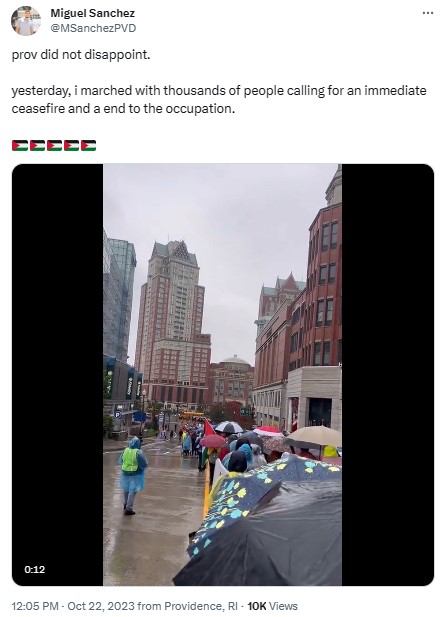While I’m catching up on noteworthy items I’ve had on my to-do list, I have to point out that General Treasurer James Diossa’s grandstanding talk about “evaluat[ing] the banking relationship and the state’s business with Washington Trust Company” ought to be disqualifying for him to continue holding his position. I’ve offered my opinion on the Biden Administration’s shake-down operation for financial institutions, but the point here is broader. I could see the general treasurer having a position if asked in passing, but Diossa promoted his statement as part of an ideological pile-on. Somebody in his position should be more respectful of the fact that Rhode Islanders’ livelihoods depend on businesses within the state.
Sadly, politicians’ words matter, and we’ve got a particularly callous and irresponsible bunch in office, these days.
[Open full post]On WNRI 1380 AM/95.1 FM, John DePetro and Justin Katz discuss:
- Hints that even Rhode Island Democrats are spotting the game Miguel Sanchez is playing
- The mounting need for Democrats to recognize the monster they’ve courted
- Bridgeport voter fraud strikes close to home
- Dighton-Rehoboth field hockey begins breaking through the fog of trans-sports madness
- Woonsocket land deal raises a flag for broader government corruption
- CD1 election arrives with a whimper, not a bang
Featured image by Justin Katz using Dall-E 3.
[Open full post]This tweet from Democrat Attorney General Peter Neronha is a little old, but I didn’t want to let it pass without comment in this space:

The people who own property in the state have rights, too. Many, probably most, of them are “people of this great state.” The AG has to enforce the laws as written, in which case we, the People, should take up abuses with our legislators, but being triumphal about being a free lawyer for some Rhode Islanders against others is the sign of an unhealthy political philosophy.
[Open full post]Although it no-doubt reveals my prejudices, if I were to rank Rhode Island’s handful of institutions of higher education on matters of freedom of thought, I’d expect Brown University — the Ivy League bastion of the elites and producer of the likes of Aaron Regunberg and Tiara Mack — to top the list of badness. Say what one will about a state school like the University of Rhode Island, where I received my undergraduate degree, most casual observers might expect it to be broader in scope, personnel, and clientele, dragging its ideological character closer to center.
That being the case, I’ve been genuinely surprised by recent discoveries. Consider this from stats-pro Nate Silver. Drawing on a survey of students, Silver offers the unsurprising news that (quote) liberal students are utterly intolerant of people with whom the disagree on issues core to their belief systems while (quote) conservative students are very open. What caught my attention was that the University of Rhode Island is the fifth-most-intolerant institution on the list when it comes to people who ought to be permitted to speak on campus. This should be a subject of news reports and shame in our state. The ACLU is quick to jump in with its schoolmarmish “tut-tut” when the governor decides no longer to maintain a patronage job for a radical who supports genocide, but the organization’s concern about civil liberties apparently extends only so far.
The survey, conducted by College Pulse and the Foundation for Individual Rights and Expression (FIRE), only captured data from Brown and URI in Rhode Island, but the Ivy institution at least ranked “average” for its speech climate, whereas URI ranked “below average.” As indicated above, URI is 244th on the matter of tolerating controversial speakers, but it does worse than Brown on every front except one — how acceptable students find it to disrupt and prevent controversial speakers. To be fair to my alma mater (and my biases), this does raise an interesting possibility. If the only area in which Brown is less tolerant than URI is students’ support for shutting down any controversial speakers who manage to make it to campus, it may be that so many students at Brown feel “comfort expressing [their] ideas” because the university does much more to ensure that nobody on the campus will actually desire to express contrary ideas. If the student body is of like mind, then most of its members will feel comfortable “discussing difficult topics on campus,” as well as silencing anybody who might take the opposing view on such topics.
I attended the University of Rhode Island a year or two after it was named the biggest party school in the country, and the mood on campus was palpably directed toward shedding that title. There should be even more concern about shedding its status as a home of censorship and intolerance. Perhaps URI President Marc Parlange can find some time to make an issue of the matter as he hones the language of his land acknowledgements and replace one or two of the many administrators tasked with advancing left-wing “diversity” causes with positions tasked with ensuring that genuine diversity is tolerated.
Featured image by Justin Katz, using Dall-E 3 and Photoshop AI.
[Open full post]I believe in humanity’s ability to adapt and recover, but it typically comes at the expense of a lot of waste and pain. I’m increasingly worried that we’ve cheated younger generations of the ability to think. Not only are schools failing to teach it, but our emphasis on schooling has drawn many children and young adults away from the work that would once have taught them the same lessons outside of school.
[Open full post]On WNRI 1380 AM/95.1 FM, John DePetro and Justin Katz discuss:
- Sanchez comes under fire for revolutionary march.
- CD1 shows the problem with a GOP that never gets to practice winning.
- Spin on education continues as usual in RI.
- WPRI and WJAR show different willingness to report on progressives.
- RI pols’ childish spin on state-to-state migration.
Featured image by Justin Katz using Dall-E 3 and Photoshop AI.
[Open full post]On WNRI 1380 AM/95.1 FM, John DePetro and Justin Katz discuss:
- The uncovered antisemitism of anti-Israel rallies
- The discouraging new face of Rhode Island’s labor movement
- The attorney general’s unclear criteria for muting people he calls “trolls” on Twitter
- Diossa moves Rhode Island more deeply into pension-problem amnesia
- Multi-language learning students proliferate, sparking demands for more taxpayer money
Featured image by Justin Katz using Dall-E 3.
[Open full post]Providence Democrat City Councilor Miguel Sanchez has been catching some deserved flack for marching with the anti-Israel rally in Providence over the weekend (although the criticism is coming from people who don’t exist within the awareness of Rhode Island power):

If local journalists weren’t so intent on not paying attention to the wrong people, they might think to ask Mr. Sanchez whether he heard the rally leaders chanting something about how Jews have to go. This conspicuous silence aside, it would be no surprise if Sanchez had chanted along.
The day of Hamas’s barbaric sneak-attack on peaceful Israelis in their homes, which (if it needs noting) was prior to Israel’s military response, Sanchez commended a statement by Texas congressional candidate Pervez Agwan redirecting blame:
“The images coming out of Palestine-Israel this morning are horrifying. It is unconscionable that the Netanyahu regime has ignited a powder-keg in the region by locking the Palestinian people in the open-air prison that is the Gaza Strip and throwing away the key. The Israeli government must respect Palestinian human rights instead of committing the heinous crime of apartheid.”
Agwan goes on to put blame on the foreign policy of the United States, as well. He’s too clever by half, asserting that he “unequivocally condemn[s] all attacks on civilians,” while writing his statement in such a way that a reader would think that Israel had performed the massacre with U.S. assistance. To consolidate the problem into a single observation: He doesn’t mention Hamas once. Simply consider that it’s a “statement on violence in Palestine-Israel.” He’s being deliberately (and evilly) dishonest.
Anybody inclined to ignore these statements from Agwan and Sanchez as mere talk from inconsequential political figures should rethink. Such radicals as these are on the political upswing, and it wouldn’t be fear mongering to say they are intent on overthrowing the United States as it exists. The donate button on Agwan’s campaign site says he’s engaged in revolution, which, if nothing else, exposes the talk about January 6 and “insurrection” as so much partisan nonsense. The same media personalities who’ve hyperventilated about that day are uninterested in or supportive of candidates and elected officials who proclaim revolution.
Americans are especially vulnerable to this rhetoric because revolution is in our founding story, so we can be slow to understand that the socialists among us use words to mean different things altogether. The “open-air prison” of Palestine, for example, doesn’t mean some walled off pen that Palestinians aren’t permitted to leave. It means a limited boundary beyond which Israel exists. When the radicals say “democracy,” what they mean is a condition in which they win without fail. When they talk of “racism and oppression,” what they mean is that their political opposition is refusing to surrender to the Marxist revolution.
When one of their chant leaders slips in the comment that Jews have to go, the crowd accepts it because they understand “Jews” to mean white people whose society has succeeded. That is, they think all of us have to go. If nobody pushes back, they’ll soon be referencing the “open-air prison” of being a minority in the United States and blaming non-revolutionaries for fostering the “powder-keg” that leaves the revolutionaries no choice but to decapitate our babies and murder us on a calm Sunday morning.
Featured image by Jose Clemente Orozko on WikiArt.
[Open full post]When you chant “Palestine will be free, from the river to the sea,” what those within Israel or externally supportive of the country hear is similar to what you would hear if a large group of conservatives marched in the street chanting: “White people will be free, from Bar Harbor to San D.”
You would infer an insinuation that “freedom” in this context means expulsion of the Other and that this prohibition must span from one border of a region (i.e., the United States) to the other. And you’d be correct to object to a group’s shouting chants that ignore the reality of representative democracy and the rule of law.
I suspect many progressives’ thought process is that Hamas’s recent atrocities were horrific, but the solution is to allow Palestinians, more broadly than Hamas, their area of autonomy. I’d be surprised if most don’t think “the river to the sea” means the borders of Gaza. Alternately, they may be using the apartheid framing, imagining that non-Jews are oppressed in Israel, in which case “freedom” means their enfranchisement throughout the country.
They should learn that those responses are not captured by the “river to the sea slogan.” Rather, the people chanting it are responding to the terroristic slaughter of Jews in Israel by endorsing their expungement from the region, which the rest of us understand as genocide, indeed.
[Open full post]Step 1: Construct a simplistic narrative with obvious good guys and bad guys and a conclusion with which nobody reasonable could disagree.
Step 2: Ensure that the “bad guys” can’t actually harm the people protesting.
Step 3: Provide singsong, rhythmic slogans that sound innocuous, but that the intended opposition will understand as threatening.
Step 4: Cultivate a supportive environment with quick dopamine rewards for easy actions and peer reinforcement.
Step 5: Guarantee no (or nominal) consequences for ostensibly rebellious behavior.
Step 6: Repeat to the point of violence or absolute control.
[Open full post]






